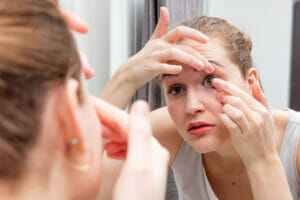Do your eyes often feel irritated, gritty, or dry? These are some of the signs of a condition called dry eye syndrome.
Dry eye syndrome is a chronic condition caused by poor tear production or poor tear quality in most people. Your eyes can feel dry for several reasons, like dehydration, living in a dry environment, or even as a reaction to your contact lenses.
Some people can find relief from the symptoms of their dry eyes by making small lifestyle changes, like drinking more water, reducing screen time, and remembering to blink. But if you have dry eye syndrome, you may need to see your eye doctor, explore your treatment options, and understand the root cause of your dry eyes.
But how do you know if your dry eyes are severe enough to warrant seeing your eye doctor and discussing your treatment options? Keep reading for 6 signs you may need to consider dry eye treatment!
1. Your Eyes Are Frequently Irritated

If your eyes feel dry occasionally, it’s likely due to your environment and where you live. Your eyes are more likely to feel dry if you’re somewhere that’s very cold or dry.
But if your eyes seem to cause you feelings of discomfort no matter where you are, and they feel gritty even when they’re clean, that may be a sign of dry eye syndrome. Dry eyes also feel different from having allergy symptoms.
When you have allergies, one of the most common symptoms is usually itchy eyes, which may lead to puffiness and the appearance of swollen lids. If you have dry eye syndrome, you may experience some itchiness, but the most apparent symptom is often inflammation and irritation. If your eyes frequently feel inflamed, it may be time to see an eye doctor.
2. You Have Eye Fatigue
When your eyes are often irritated, it can be harder to use them as you should. Even if you aren’t experiencing severe discomfort, you may still suffer from dry eye syndrome symptoms if your eyes get tired quickly.

This symptom can be especially apparent if you spend a lot of time using screens and digital devices. If you’re on your computer a lot and find it harder and harder to keep working while looking at the screen, it could be because of your dry eyes.
Frequent screen use can also worsen dry eye symptoms since blue light from computer screens can dry your eyes even more. If you need to use a computer for your job, simply stopping your computer use isn’t an option, so treatment is often the best solution. Remember that taking breaks while using the computer and other devices can help keep symptoms of eye fatigue at bay.
3. Taking a Break from Contacts Doesn’t Bring You Relief

If you wear contact lenses, they may be contributing to feelings of dryness and irritation. Contact lenses sit on top of your cornea and are meant to be breathable, ensuring that your eyes get enough oxygen while you have them in.
For some, even if they wear their contacts precisely as directed and use enough solution to keep their contacts lubricated, they may still experience eye irritation. When they get too irritated, most eye doctors suggest taking a break from contact lenses.
But if taking a break and wearing glasses for a while doesn’t help improve your dry eye symptoms, there may be a different underlying cause that warrants treatment.
4. Over-The-Counter Medication Doesn’t Help

One of the best ways to relieve eye irritation is with artificial tears. These are sold over-the-counter at most pharmacies.
They’re sometimes also called lubricating eye drops. Using them when your eyes feel too dry can help them feel better.
But if using them as directed doesn’t provide you the relief you’re looking for, the issue may be deeper than a temporary case of dry eyes. It could be a sign of dry eye syndrome, which usually needs professional treatment.
5. You Don’t See Any Difference When You Change Your Environment
Since your environmental conditions can frequently contribute to dry eyes, changing your environment can be an excellent way to help your eyes feel less irritated. If you live in a dry climate, you can use a humidifier in your home.

Cold air is also often the culprit when it comes to environmentally triggered dry eyes. In the winter, you can counter this by limiting your time spent outside. Try using your air conditioning less during the summer, or do your best to stay away from air vents when your AC is running.
During any time of year, you can help your dry eye symptoms by staying hydrated. Make sure you drink enough water and don’t spend too much time outside when it’s very hot or cold.
But if making these small environmental changes doesn’t give you any relief, you may need treatment from your ophthalmologist.
6. You Want Relief From Your Dry Eyes

In the end, you can seek treatment for your dry eyes any time you want relief. Whether or not you’ve tried making minor changes, you can go to a medical professional for diagnosis and advice.
If you haven’t tried making environmental changes and using artificial tears, this may be the first thing they tell you to start trying. But they can also suggest further non-invasive treatments like nutritional supplements.
If they find your dry eyes are concerning and that you may have dry eye syndrome, they may also recommend more intensive treatments. One treatment for patients with chronic dry eye is punctal plugs.
Punctal plugs involve inserting plugs into the tear ducts, where your tears drain from your eyes. By blocking the tear ducts, it forces your tears to stay on the surface of your eyes longer, keeping them moist and lubricated.
At Sierra Nevada Eye Center, we can help diagnose and treat your dry eye effectively, giving you relief from irritated and inflamed dry eyes. Ready to find the relief you need from your frustrating dry eye symptoms? Schedule an appointment at Sierra Nevada Eye Center in Reno, NV, today!


